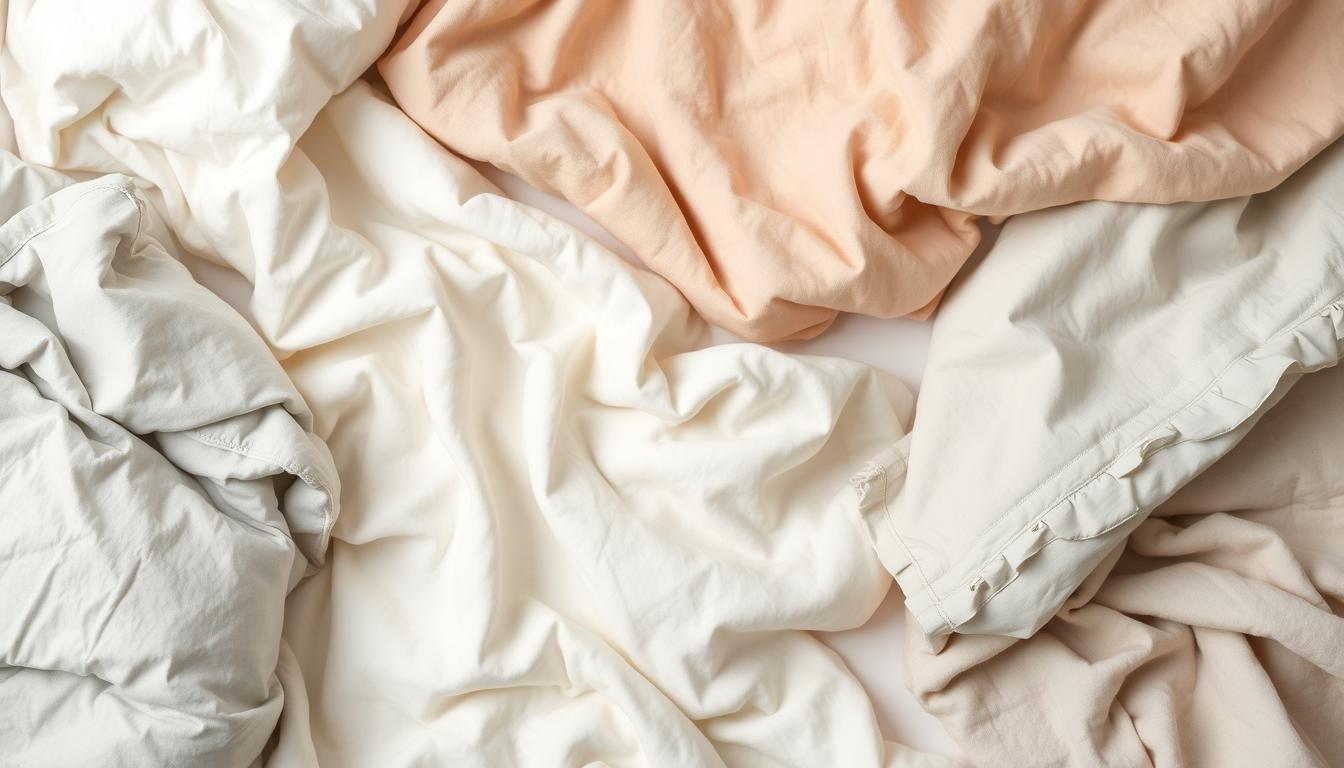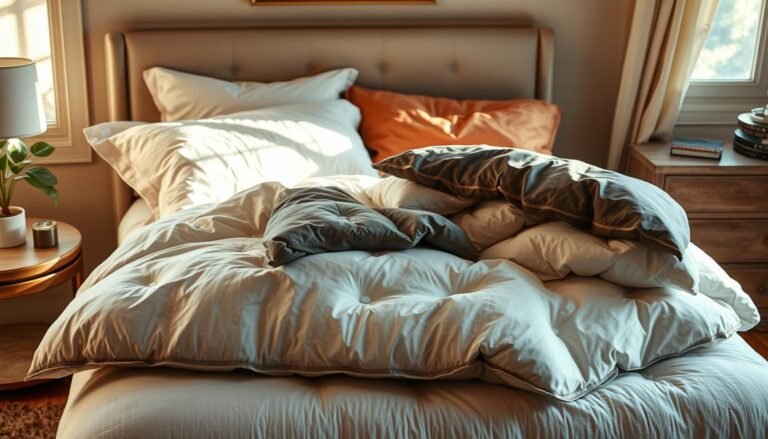Best Material for Duvet Cover: Top Choices
Choosing the best duvet cover materials affects both comfort and bedroom aesthetics. You have many options like TENCEL™ Lyocell, Egyptian cotton, linen, and bamboo rayon. Each has its own beneficial properties. For buttery-soft texture, TENCEL™ Lyocell stands out. Egyptian cotton is celebrated for its softness and long-lasting quality.
Linen becomes softer over time and is the most breathable due to its hollow fibers. For those who get cold easily, cotton flannel is a great choice. Bamboo rayon is soft, hypoallergenic, and often mixed with cotton to enhance its qualities.
Your own likes play a big role in finding the best material. You might love silk for its luxury, bamboo for its green footprints, or microfiber for its adaptability. Premium duvet covers offer supreme softness. They come in various textures and finishes, ensuring there’s a perfect fit for all bedroom aesthetics and sleep needs.
Introduction to Duvet Cover Materials
Choosing the right duvet cover material is key to improving your bedroom’s feel and your sleep. We look at why different fabrics matter for better sleep. This includes their warmth, feel, and how well they let air through.
Importance of Material Choice
Duvet cover materials affect your comfort all night. Cotton is popular for being soft, breathable, and long-lasting. Egyptian cotton is even better, with its smooth threads and high thread counts. Tencel, made from eco-friendly trees, is great for staying cool and dry. Picking the right fabric is very important for good sleep.
How Material Affects Sleep Quality
The fabric of your duvet cover can make or break your sleep. Linen is amazing for staying cool and dry, especially for those who get hot at night. It’s great at moving moisture away, supporting deep sleep. Silk duvet covers are soft and don’t irritate skin, good for allergy sufferers. Synthetic materials like polyester are more budget-friendly. They resist wrinkles and are easy to look after but might not be as cool. A thread count of 200 to 400 works well, offering a nice feel and quality sleep.
Cotton Duvet Covers
Cotton duvet covers are loved by many for their great durability and easy care. They are perfect for all seasons, ensuring comfort all year. The use of Egyptian and Supima cotton makes them even more luxurious and tough.
Benefits of Cotton
Choosing cotton duvet covers brings many benefits. Their breathability helps regulate body temperature while sleeping. They are also absorbent, which is ideal for those who sweat at night.
Cotton’s toughness means it stays in good condition even after many washes.
Types of Cotton: Egyptian, Supima
Egyptian and Supima cotton are highly sought after. Egyptian cotton is known for its soft and durable long fibers. In luxury hotels, Egyptian cotton sheets, with thread counts from 300 to 800, make sleep better.
Supima cotton has long fibers too, offering a soft and sturdy duvet cover for everyday use.
Thread Count and Weave Considerations
The thread count is very important for cotton duvet covers. A higher thread count means the fabric is softer and feels more luxurious. If you want warmth at night, go for a higher thread count.
For a cooler sleep, choose a lower thread count. The cotton’s weave also affects its texture and how it works. Percale weaves feel crisp, while sateen weaves are silkier.
| Type of Cotton | Thread Count Range | Key Features |
|---|---|---|
| Egyptian Cotton | 300-800 | Luxurious, Durable |
| Supima Cotton | 250-600 | Soft, Resilient |
| Percale Weave | 200-400 | Crisp, Breathable |
| Sateen Weave | 300-600 | Silky, Smooth |
Linen Duvet Covers
Linen duvet covers are known for their unique features. They’re breathable, durable, and easy to care for. With each wash, they become softer. This makes them a favorite for those who value comfort and durability.
Features and Advantages
Linen duvet covers are perfect for those who get warm at night. They keep you cool and dry by wicking away moisture. Their natural look adds elegance to any room. They match with many styles, enhancing your bedroom’s appearance.
Durability and Maintenance
Linen is very strong, lasting longer than other bedding. At first, they’re stiff. But, they become incredibly soft over time. Caring for them is easy. Just wash and air dry. You’ll see they remain comfortable for years.
Seasonal Versatility
Linen duvet covers work well in any season. They cool you down in the summer. In winter, they keep you warm. This makes them a smart choice for any time of the year.
What is the Best Material for Duvet Cover?
Choosing the best duvet cover material means thinking about the climate, how you like your bedding to feel, and how warm you want to be. The materials you pick can really change how well you sleep.
TENCEL™ Lyocell is known for its silky texture which offers a great night’s sleep. Egyptian cotton is also a top choice because it’s soft and lasts a long time. Plus, bamboo rayon is good for people with allergies or sensitive skin because it’s hypoallergenic and eco-friendly.
Bamboo covers can also keep you cool, which helps you sleep better. Let’s look more closely at some materials that are really good at making bedding better.
| Material | Benefits | Best For |
|---|---|---|
| Cotton (300+ thread count) | Soft, breathable, easy to maintain | All-around comfort |
| Bamboo Rayon | Cooling, hypoallergenic, sustainable | Hot sleepers, allergy-prone individuals |
| Silk | Luxurious, breathable, gentle on skin | Those seeking luxury and comfort |
| Linen | Sustainable, durable, temperature regulating | Eco-conscious consumers |
| Polyester Cotton Blend | Durable, resistant to wrinkles, affordable | Budget-friendly and easy care |
People love the Bare Home Duvet Cover and Parachute Sateen Duvet Cover. They find these covers combine comfort, quality, and style really well. By picking the best duvet cover material, you’re investing in better sleep and your health.
Silk and Bamboo Duvet Covers
Choosing luxurious duvet covers means looking at silk and bamboo for their unique benefits. They bring elegance and offer great features. They are hypoallergenic and sustainable, making them great choices.
Silk: Luxurious and Hypoallergenic
Silk duvet covers are all about luxury. They shine and feel exceptionally soft. Silk is perfect for those with sensitive skin or allergies. It’s naturally hypoallergenic.
Silk also keeps you cool while you sleep. It’s the best for a comfortable sleep environment.
- Softest material among duvet covers, making it ideal for sensitive skin.
- Temperature-regulating properties that enhance sleep quality.
- Optimal momme weight for quality silk is between 18 and 20 momme.
Bamboo: Sustainable and Breathable
Bamboo duvet covers are known for breathability and sustainability. They’re a top choice for eco-conscious customers. Bamboo is great for those who sleep hot because it wicks away moisture.
Bamboo is also eco-friendly. It uses less water and energy than other fabrics. It’s a sustainable choice that doesn’t sacrifice comfort.
Compared to silk, bamboo lasts longer and is easier to care for. It doesn’t stain easily. Bamboo blends luxury with eco-friendliness perfectly.
- Known for exceptional breathability, perfect for hot sleepers.
- Eco-friendly, requiring minimal water and energy resources.
- Durable and easy to maintain, with resistance to staining.
| Aspect | Silk | Bamboo |
|---|---|---|
| Softness | Exceptional | High |
| Cooling Properties | Excellent | High |
| Durability | Moderate | High |
| Sustainability | Less Sustainable | High |
| Cost | Higher | Moderate |
| Hypoallergenic | Yes | Yes |
Choosing silk or bamboo duvet covers boils down to preference. Each has its perks. Silk is hypoallergenic and bamboo is sustainable. For more on comparing materials, visit this resource.
Microfiber and Other Synthetic Materials
Microfiber duvet covers are loved for their durability, easy care, and affordability. They resist stains and keep looking good even after many washes. This makes them great for those watching their budget. Microfiber is not as breathable as cotton or linen but feels light and super soft on the skin. Products like the Bare Home Duvet Cover show how comfortable they can be. They don’t wrinkle or shrink much, making them a practical choice.
Microfiber covers are tough and easy to look after. But, they might pick up moisture, oils, and dirt more than natural materials. This means they might need washing more often and careful stain removal. Despite this, their strong synthetic fibers ensure they last long and stay easy to manage. Learn more about choosing the best materials for duvet covers here.
Compared to natural fibers like cotton, microfiber offers a practical and budget-friendly choice. Although not as breathable, it still gives a cozy feel. Yet, if eco-friendliness or sensitivity is a concern, you might look at natural options. It’s important to balance comfort, durability, and care needs when choosing your duvet cover material.

Hey there, I’m Alex Hanson and I’m passionate about all things covers! Whether you’re looking for a car seat cover to protect your vehicle or an oven cover to keep your kitchen clean, I’m here to help. With years of experience in the industry, I have plenty of knowledge and insights to share with my readers. So, if you care about protecting your belongings and making them look their best, you’re encouraged to read my blog as I explore the perfect cover for every need.


